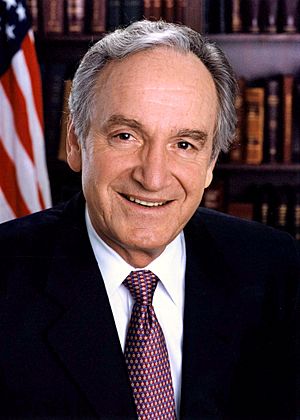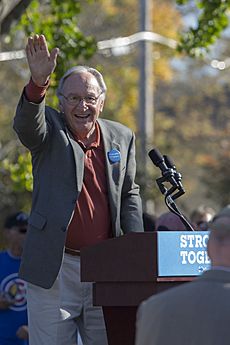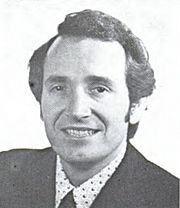Tom Harkin facts for kids
Quick facts for kids
Tom Harkin
|
|
|---|---|

Official portrait, c. 2005
|
|
| United States Senator from Iowa |
|
| In office January 3, 1985 – January 3, 2015 |
|
| Preceded by | Roger Jepsen |
| Succeeded by | Joni Ernst |
| Chair of the Senate Health, Education, Labor and Pensions Committee | |
| In office September 9, 2009 – January 3, 2015 |
|
| Preceded by | Chris Dodd (acting) |
| Succeeded by | Lamar Alexander |
| Chair of the Senate Agriculture Committee | |
| In office January 3, 2007 – September 9, 2009 |
|
| Preceded by | Saxby Chambliss |
| Succeeded by | Blanche Lincoln |
| In office June 6, 2001 – January 3, 2003 |
|
| Preceded by | Richard Lugar |
| Succeeded by | Thad Cochran |
| In office January 3, 2001 – January 20, 2001 |
|
| Preceded by | Richard Lugar |
| Succeeded by | Richard Lugar |
| Member of the U.S. House of Representatives from Iowa's 5th district |
|
| In office January 3, 1975 – January 3, 1985 |
|
| Preceded by | William J. Scherle |
| Succeeded by | Jim Ross Lightfoot |
| Personal details | |
| Born |
Thomas Richard Harkin
November 19, 1939 Cumming, Iowa, U.S. |
| Political party | Democratic |
| Spouse |
Ruth Raduenz
(m. 1968) |
| Children | 2 |
| Education | Iowa State University (BA) Catholic University of America (JD) |
| Military service | |
| Allegiance | |
| Branch/service | |
| Years of service | 1962–1967 (Active) 1967–1989 (Reserve) |
| Rank | |
| Unit | Naval Air Facility Atsugi Guantanamo Bay Naval Base |
Thomas Richard Harkin (born November 19, 1939) is an American lawyer and politician. He served as a U.S. Senator for Iowa from 1985 to 2015. Before that, he was a U.S. Representative for Iowa from 1975 to 1985.
Harkin is a member of the Democratic Party. He is well-known for being the main author and sponsor of the Americans with Disabilities Act of 1990. He even gave part of his speech introducing this important law in sign language so his deaf brother could understand.
Contents
Early Life and Education
Tom Harkin was born in Cumming, Iowa. His father was a coal miner, and his mother was an immigrant from Slovenia. He grew up in a house without hot running water or a furnace.
He attended Iowa State University with a scholarship from the Navy. He studied government and economics and graduated in 1962. After college, he joined the United States Navy.
Military Service
Harkin served as an active-duty jet pilot from 1962 to 1967. He was stationed in Japan at Naval Air Facility Atsugi. There, he helped move aircraft that were damaged in the Vietnam War. He also flew missions from Guantanamo Bay Naval Base to support U-2 planes looking at Cuba. He retired from the Naval Reserves in 1989 as a commander.
Starting in Politics
In 1969, Harkin moved to Washington, D.C.. He worked as an aide for U.S. Congressman Neal Edward Smith. In 1970, he went to South Vietnam with a group from Congress. Harkin took photos and wrote about the terrible conditions in the "Tiger cages" at Côn Đảo Prison. His report was published in Life Magazine. He earned his law degree from The Catholic University of America in 1972.
Serving in the U.S. House of Representatives
After law school, Harkin returned to Iowa. In 1972, he ran for the United States House of Representatives but lost. He ran again in 1974 and won by a small number of votes. This was a difficult year for many Republicans because of the Watergate scandal.
Harkin served five terms in the House of Representatives. He was re-elected easily four more times.
Serving in the U.S. Senate
Senate Elections and Time in Office

In 1984, Harkin won the election for the U.S. Senate by a large margin. He was re-elected four more times, serving until 2015. He served in the Senate longer than any other Democrat from Iowa.
Even though he was a long-serving senator, he was always Iowa's junior Senator. This was because his colleague, Chuck Grassley, had been in the Senate since 1981. Despite their different political views, Harkin and Grassley had a good relationship.
Key Policies and Actions
Harkin worked on many important issues during his time in the Senate.
Support for People with Disabilities
Harkin is most famous for introducing the Americans with Disabilities Act (ADA). This law helps protect the rights of people with disabilities. He even used sign language when he introduced the bill, so his deaf brother could understand.
He later worked to improve the ADA. He felt that some court decisions were making the law less effective. He proposed changes to make sure more people with disabilities were protected.
Healthcare and Social Issues
Harkin supported President Barack Obama's healthcare reform law, the Patient Protection and Affordable Care Act. He believed it was important to prevent insurance companies from denying coverage to people with pre-existing conditions. However, he later said the law was too complicated. He thought the U.S. should have a simpler healthcare system.
He also supported embryonic stem cell research. In 2009, he supported the Iowa Supreme Court decision that made same-sex marriage in Iowa legal. He also voted to end the "Don't Ask, Don't Tell" policy, which had prevented openly gay people from serving in the military.
Other Important Work
- Child Labor: Harkin worked to fight the worst forms of child labor around the world. He helped create laws to stop products made by child labor from being imported into the U.S.
- Minimum Wage: In 2013, he introduced a bill to raise the federal minimum wage to $10.10 per hour.
- Alternative Medicine: He helped create the U.S. Office of Alternative Medicine in 1992. This office studies different types of medicine.
Committee Work
As a senator, Harkin served on several important committees:
- Committee on Agriculture, Nutrition, and Forestry
- Committee on Appropriations (This committee decides how government money is spent.)
- He was Chairman of the Subcommittee on Labor, Health and Human Services, Education, and Related Agencies.
- Committee on Health, Education, Labor, and Pensions (He was the Chairman of this committee.)
- Committee on Small Business and Entrepreneurship
1992 Presidential Campaign
Harkin ran for President in 1992. He was a "populist," meaning he focused on the needs of everyday working people. He won the Iowa caucus and some other early contests. However, he later dropped out of the race and supported Bill Clinton, who went on to win the presidency.
Harkin was considered as a possible running mate for president several times. He was thought of by Bill Clinton in 1992, Al Gore in 2000, John Kerry in 2004, and Barack Obama in 2008.
Personal Life

Tom Harkin married Ruth Raduenz in 1968. They have two daughters, Amy and Jenny. Ruth Harkin is also a lawyer. She was one of the first women in the U.S. to be elected as a prosecutor. She also held important government positions, including leading the Overseas Private Investment Corporation (OPIC) under President Bill Clinton.
Harkin made a short appearance as himself in the 1993 movie Dave. His daughter Amy was on the TV show Starting Over from 2003 to 2004.
In 2015, Tom Harkin was the grand marshal for the first Disability Pride Parade in New York City. He was also the grand marshal for the Chicago Disability Pride Parade that same year.
Images for kids
See also
 In Spanish: Tom Harkin para niños
In Spanish: Tom Harkin para niños
- 21st Century Democrats
 | Tommie Smith |
 | Simone Manuel |
 | Shani Davis |
 | Simone Biles |
 | Alice Coachman |




